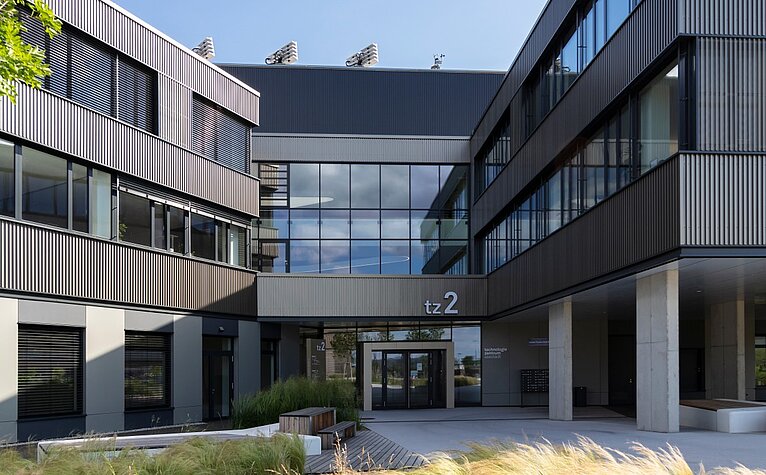 © Daniel Hawelka
© Daniel Hawelka
- Location advantages
- Innovation and digitalisation
- News
Additive, adaptive, autonomous: Vienna's research for manufacturing
09. September 2025At TU Wien and in Vienna’s Seestadt district, the things that will keep industrial production fit for the future are being developed. Machines detect their own wear. Materials respond to their environment. Production processes adapt in real time.
TU Wien is among Europe’s leading research institutions for advanced manufacturing. Its researchers are driving the transfer of technologies such as artificial intelligence (AI), foundation models and the Industrial Internet of Things (IIoT) into industry. TU links technological, organisational and systemic perspectives on modern manufacturing and examines the complex challenges of industrial value creation—from individual materials and machines to production and logistics networks. The focus is on developing energy-efficient, flexible production systems that dynamically balance throughput, costs, quality, energy consumption and environmental impacts. This enables resilient, adaptable and resource-efficient manufacturing.
Materials and manufacturing for industry
TU Wien’s advanced manufacturing research programme is broad and practice-oriented. Key forward-looking topics include autonomous and self-healing production systems that, based on semantic technologies, context-sensitive control and distributed intelligence, perceive, decide and act. With AI-based defect detection, digital immune architectures and adaptive materials, machines and systems will in future regenerate autonomously, handle disruptions and extend their service life. The team pursues interdisciplinary collaborations with industry partners, SMEs and research institutions in Austria and abroad.
Materials science, for example, investigates materials for additive manufacturing, in which material is applied layer by layer. This includes materials- and application-oriented 3D-printing processes as well as polymer- and ceramic-based biomaterials that meet exacting requirements, alongside research into bioprintingbioprinting (). Additive manufacturing offers design freedom and the cost-effective production of customised items, used above all in functional surfaces for sensor technology and data storage, and in medical technology. In parallel, materials are being developed for extreme conditions such as high temperatures or exposure to hydrogen for use in sensors, high-temperature electrolysis and components subject to high mechanical loads.
Manufacturing engineering is working on highly precise, efficient production processes using methods such as laser processing. Machine tools, automation, robotics and assembly are being advanced to make demanding process chains ready for industrial deployment. Sensors and digital control can capture data in real time and automatically optimise parameters. Virtual models such as digital twins and simulation-based planning form the basis for autonomous, resource-efficient manufacturing systems—a mainstay of whole-system optimisation and circular material flows.
Innovation in production management and human–machine interaction
In production and maintenance management, TU Wien is developing data-driven, robust and sustainable control and planning systems for medium- and long-term production decisions. Productivity and resource use are optimised beyond the boundaries of individual factories. Relevant communication technologies include 5G infrastructures, AI-based decision support, simulation-based optimisation and condition-based analytics. Project examples: WINWIN () and ReMAIntAInReMAIntAIn ().
Industrial engineering explores the interplay between humans and machines. The aim is to create sustainable, user-friendly and adaptive systems. TU Wien studies human activities in digitally networked production environments. The foundation here is circular processes such as disassembly and remanufacturing—the structured dismantling and reconditioning of technical systems—together with accessible work instructions and AI-supported systems for analysing and preventing ergonomic strain. New technologies such as robotics and connected solutions enable the meaningful digitalisation of the working world. Projects include: Assist to Produce and Ergo4All.
Testbed for the production of the future
The Faculty of Advanced Manufacturing at TU Wien has modern laboratories, pilot plants and digital infrastructures. In Seestadt AspernSeestadt Aspern () it has operated Austria’s first digital pilot factorypilot factory () since 2015. Working with more than 20 companies, including Opel, Atos and HOERBIGER, it is developing new methods for virtualising and digitising industrial processes. One example is collaboration with Siemens, where digital twins are used to map and optimise production processes. In a project with Fraunhofer AustriaFraunhofer Austria (), TU Wien is researching how to link sensor data from machines and logistics processes intelligently.
Take the virtual tour: Pilot Factory Industry 4.0 at TU WienPilot Factory Industry 4.0 at TU Wien (). With ongoing expansion to around 17,000 square metres, Seestadt is bringing smart, application-oriented production into the city and benefits from close proximity to research.
Read more about advanced manufacturing in Austria here: Advanced ManufacturingAdvanced Manufacturing ().